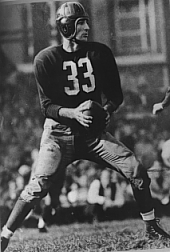I've been spending the past month making my way through a stack of football books I didn't have time to read during the regular season. Right now I'm working on Next Man Up by John Feinstein. It's a behind-the-scenes, day-by-day account of the 2004 NFL season as experienced by the Baltimore Ravens. So naturally the cover of the book shows the Carolina Panthers taking the field (that's Chris Weinke at far right).
Anyway, I'm toodling along and I come across this line, in reference to the NFL's weekly injury report:
"There's no doubt that the league monitors the injured list closely in the interest of fairness, so teams can't simply lie or even hedge too much about injuries. Of course, the injury list is also important to gamblers since knowing who will and won't play affects betting lines and who bets on whom. The league would love people to believe that its popularity is based solely on the wonders of the game. ... The fact is that a large chunk of the league's popularity is driven by the fascination people have with betting on the games, both legally and illegally." (emphasis added)This is a point I see made over and over by football writers: The NFL, the argument goes, is engaged in hypocrisy because on one hand it takes a public stance against gambling, while on the other it provides valuable information to gamblers in the form of the injury report. This argument, like many made by football writers, is predicated either on ignorance of NFL history or on willful disregard of it.
The NFL instituted the weekly injury report nearly six decades ago in the wake of the Hapes-Filchcock scandal. (Here's the part where you say: The what?) Before the 1946 NFL Championship Game, gamblers had befriended New York Giants players Merle Hapes and Frank Filchcock, plied them with free drinks and, I suppose, "broads," and tried to get them to throw the game. Though neither player accepted the money offered, neither reported the bribe attempts to the league, either. After the Giants lost the NFL title to the inferior (but nevertheless favored by 10 points) Chicago Bears, rumors of a fix spread. Hapes and Filchcock ended up suspended, essentially for life. And as NFL commissioner Bert Bell worked to clean up the league's image after the scandal, he declared:
"The game and its players must be kept free from corruption, from all bribes and offers of bribes and from any possible 'fixing' of games." (quoted in America's Game by Michael MacCambridge)Central to this effort, of course, was preventing players (and others who could affect the outcome of games) from consorting with gambling interests. At the time, teams were constantly shadowed, and players constantly approached, by gamblers willing to pay generously for inside information that would provide a betting edge. Anyone who sold such information ended up compromised and susceptible to coercion -- threatened to throw a game, or shave points, or else be exposed at the cost of his career. No piece of inside information was more valuable than a team's injury status. That's why at the start of the 1947 season the league began publishing a weekly list of those players who were injured and less than likely to play. Because injury news was now widely disseminated, it was no longer "inside" information.
So, the injury report was not instituted in the interest of "fairness" between teams. From the beginning, the league acknowledged that the report existed because of gambling. League officials don't live in a fantasy world. They knew then and they know now that "a large chunk of the NFL's popularity" breaks down to money changing hands every Monday morning. They can't change that, but what they can do is make every effort to prevent the money wagered on the outcome of a game from determining the outcome of that game. Yes, the net overall effect of the injury report has been to make the game more attractive as a betting proposition -- but it has reduced the game's exposure to tampering.
When the subject is the NFL injury report, Feinstein and those like him are attacking a straw man. They cluck their tongues at the NFL and indict the league for pretending that the injury report is not gambling-related. But they're the ones who are pretending. They're pretending that the NFL is pretending that it's not gambling-related. It makes better copy -- it's "funny" -- to frame the issue this way, but it's intellectually dishonest and historically ignorant.
And it's old. It was old all the way back in 1991, when disgraced L.A. Stallions quarterback Jimmy Dix asked: "Why, Joe? Why is there an injury report in pro football, huh? Nobody else has a f---ing injury report, but football does, so the f---ing gamblers will know the spread."
Words to live by.


No comments:
Post a Comment